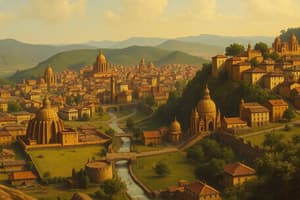Podcast
Questions and Answers
Which of the following crops were primarily cultivated in the Indus Valley Civilization?
Which of the following crops were primarily cultivated in the Indus Valley Civilization?
- Wheat, Lentils, Rice
- Oats, Mustard, Cotton
- Wheat, Barley, Rice (correct)
- Corn, Barley, Cotton
What was a significant feature of the trade system in the Indus Valley Civilization?
What was a significant feature of the trade system in the Indus Valley Civilization?
- Lack of trade with Mesopotamia
- Trade only through maritime routes
- Extensive trade with Mesopotamia and Bahrain (correct)
- Trade exclusively with local regions
Which animal was not domesticated in the Indus Valley Civilization?
Which animal was not domesticated in the Indus Valley Civilization?
- Dog
- Pig
- Sheep
- Elephant (correct)
What unique characteristic of cotton production is attributed to the Harappan people?
What unique characteristic of cotton production is attributed to the Harappan people?
Which of the following materials was NOT listed as an import in the trade of the Indus Valley Civilization?
Which of the following materials was NOT listed as an import in the trade of the Indus Valley Civilization?
Flashcards
Indus Valley Crops
Indus Valley Crops
The Indus Valley people cultivated wheat, barley, rice, dates, mustard, sesame, and cotton.
Indus Valley Animals (Domesticated)
Indus Valley Animals (Domesticated)
Domesticated animals included sheep, goats, oxen, bulls (humped/hump-less), buffalo, pigs, dogs, cats, fowl, and deer.
Indus Valley Trade
Indus Valley Trade
Indus Valley civilization had wide-ranging trade connections, both domestically and internationally.
Meluhha
Meluhha
Signup and view all the flashcards
Indus Valley Cotton
Indus Valley Cotton
Signup and view all the flashcards
Indus Valley Trade Partners
Indus Valley Trade Partners
Signup and view all the flashcards
Indus Valley Imports (Metals)
Indus Valley Imports (Metals)
Signup and view all the flashcards
Indus Valley Exports
Indus Valley Exports
Signup and view all the flashcards
Surkotada's Horse
Surkotada's Horse
Signup and view all the flashcards
Shatughai & Mundigak
Shatughai & Mundigak
Signup and view all the flashcards
Mesopotamian Trading Sites
Mesopotamian Trading Sites
Signup and view all the flashcards
Lack of Iron
Lack of Iron
Signup and view all the flashcards
Study Notes
Indus Valley Civilization - Trade and Crops
- Surkotada (Gujarat): Only Indus site where horse remains found.
- Main Crops: Wheat, barley, rice (evidence found in Lothal and Rangpur).
- Other Crops: Dates, mustard, sesame, cotton.
- Animals: Sheep, goats, oxen, humped/humpless bulls, buffalo, boar, dogs, cats, pigs, fowl, deer, tortoise, elephants, camels, rhinoceros, tigers, etc. Lion was not known.
- Trade: Extensive inland and foreign trade with Mesopotamia/Sumeria (modern Iraq) and Bahrain. Riverine and oceanic commerce was significant.
Indus Valley Civilization - Imports
- Gold: From Kolar (Karnataka), Afghanistan, and Persia.
- Silver: From Afghanistan and Persia, South India.
- Copper: From Khetri (Rajasthan), Baluchistan, and Arabia.
- Tin: From Afghanistan and Bihar.
- Lapis Lazuli and Sapphire: From Badak-shan (Afghanistan).
- Jade: From Central Asia.
- Steatite: From Shahr-i-Sokhta (Iran), Kirthar Hills (Pakistan).
- Amethyst: From Maharashtra.
- Agate, Chalcedony, and Carnelians: From Saurashtra and West India.
Indus Valley Civilization - Exports
- Exports: Agricultural products, cotton goods, terracotta figurines, pottery, beads (from Chanhudaro), conch shells (from Lothal), ivory products, copper, etc.
- Iron: Not known to the Indus people.
Indus Valley Civilization - Trade Relations
- Sumerian Texts: Refer to trade with 'Meluhha' (name for the Indus region).
- Intermediate Stations: Dilmun (Bahrain), Makan (Makran coast).
- Mesopotamian Places: Susa and Ur where Harappan seals found.
- Shatughai and Mundigak: Indus sites found in Afghanistan.
Indus Valley Civilization - Cotton
- Earliest Producers: Harappans were the earliest to produce cotton.
- Greek Name: Called 'Sindon' by the Greeks.
Studying That Suits You
Use AI to generate personalized quizzes and flashcards to suit your learning preferences.
Description
Explore the fascinating trade networks and agricultural practices of the Indus Valley Civilization. From the unique crops cultivated, like wheat and rice, to the extensive trade routes connecting them with Mesopotamia and beyond, this quiz covers key aspects of one of the world's oldest civilizations.




